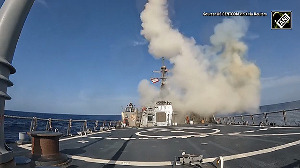The Indian strategic community and the media have come perilously close to being left behind by the country's political leadership.
The media has an innate talent to reshuffle pace and swiftly adapt to changing times. But their sheer ponderousness keeps strategic analysts from being nimble enough.
And the danger is, unless they move with extraordinary swiftness of thinking, they may incrementally get consigned to irrelevance. It is a tragedy, and a waste, that can happen.
Time stood still in the Indian strategic thinking in the post-Soviet era. And when last week Russian President Vladimir Putin articulated on the tensions that have come to prevail in the international system, many were rudely surprised.
Actually, these tensions have been accumulating over the past 10-year period. Indeed, they were inevitable.
They are implicit in the inability of the newly emerging power centers in the 21st century world order -- such as Russia, China , India, Brazil , etc -- finding themselves unable to reconcile with any imposition of a 'unipolar' world order.
Simply put, these power centres are too conscious of their own tryst with destiny.
Foreign Minister Pranab Mukherjee's recent visit to Iran calls out from the rooftop that the Indian strategic community has a lot of catching up to do. See the timing of the visit.
The United States has been stealthily finessing a pretext for launching a military attack on Iran. It has been prevailing on close allies and friends to stay clear of bilateral political exchanges with Teheran. Isolation and containment of Iran and a 'regime change' in Iran have become the leitmotif of US foreign policy.
Did Washington make an exception for India, or was India, after all, never really belonging to the gallery of Washington's close or 'natural' allies?
At any rate, New Delhi acted in its best interests when Indian Foreign Minister Pranab Mukherjee paid a two-day visit to Teheran on February 6-7.
He made it unequivocally clear in his media comments that India opposed any use of force against Iran.
Apart from underlining that expansion of relations with Iran is important for India, Mukherjee described Iran as a factor for stability in the region. That is to say, India disregards Washington's propaganda that Iran is a terrorist state that is threatening regimes in neighbouring countries.
Equally, Mukherjee called for the Iran nuclear file to be sent back to the International Atomic Energy Agency as the competent forum to handle the issue.
In sum, Mukherjee made out with great poise and resoluteness that New Delhi has its own independent foreign policy toward Iran.
Clearly, Mukherjee's visit had a single-minded purpose -- to set a political climate in India's bilateral relations with Iran that will be conducive to the advancement of energy cooperation between the two countries.
Much is at stake here. The proposals for a gas pipeline from Iran to India via Pakistan and a 25-year deal on liquefied natural gas have been languishing. Difficulties still lie ahead. Meanwhile, we are running against time.
Indeed, there are larger dimensions. India-Iran energy cooperation forms a crucial vector of emergent Asian security.
This became apparent during Russian President Vladimir Putin's visit to New Delhi on January 25-26, where the focus was on all-around cooperation between the two countries in the field of energy. Prime Minister Manmohan Singh characterised energy security as 'the most important of the emerging dimensions' of the Indo-Russian strategic partnership.
He said, 'Russia's position as a global leader on energy issues is widely recognised. We look forward to long-term partnership with Russia in this vital field.'
Two working groups were constituted to examine both upstream cooperation (access for Indian participation in the funding, exploration and development of oil and gas fields in Russia) and downstream cooperation (participation by Russian companies in marketing oil products and LNG in India).
Moscow has repeatedly shown interest in taking part in the financing and construction of the Iran-India gas pipeline.
Russian Deputy Prime Minister and Defence Minister Sergei Ivanov, who accompanied Putin to New Delhi, stated, 'We are pegging big hopes on the Gazprom-GAIL [Russian and Indian gas companies] strategic partnership, including joint efforts in building the Iran-Pakistan-India gas pipeline.'
Russian companies are evidently conscious of the huge volume of business generated through the transportation of Iranian gas to the rapidly growing South Asian market, apart from the highly lucrative distribution and retailing of the gas in India and Pakistan.
For receiving the gas coming through the $7 billion pipeline, infrastructure development within India alone will generate business close to $40 billion.
But energy cooperation among Russia, Iran and India has a much wider backdrop than business opportunities.
Energy
New Delhi is keeping track that many of Europe's plans to diversify its gas supply involve Iran. Europe faces an acute gas shortage by 2015. A competitive struggle for Iranian gas between the European market and the Asian market has become unavoidable.
The outcome of the Russian-Iranian energy dialogue in the recent months naturally assumed great importance.
To be sure, New Delhi estimates that the prospects for the merging of Russian and Iranian gas-transportation networks have distinctly brightened.
The Iranian Supreme Leader's adviser on international affairs, Ali Akbar Velayati, who visited Moscow last week and held discussions with Putin has said that a 'turning point' in Iran's strategic cooperation with Russia has come.
Velayati alleged that Washington is trying its utmost to disrupt the emerging Russian-Iranian strategic cooperation in the transit of energy, as it will impact phenomenally on international security.
With Russia controlling 27 per cent of the world's gas reserves and Iran 15 per cent, cooperation between these countries is bound to have a huge potential in terms of global gas distribution.
Major Asian gas consumers like India (and China) seek to optimally exploit the opportunities arising out of the matrix of Russian-Iranian energy cooperation.
From the Indian perspective, Russia's resurgence as an assertive player on the global scene and Iran's preference to the Asian market combine well. They open up prospects of a unified Asian market for gas, involving Central Asian countries as well.
China anticipated the enormous implications of these developments for its energy security.
Last June, the Beijing Morning Post gave a detailed description of China's prospective plan for developing its domestic gas-pipeline network during the next 20 years in anticipation of gas supplies from Russia and Central Asian countries. According to the report, China 's 24,000-kilometer gas-pipeline grid will be expanded to 36,000km by 2010.
The emerging Asian market for gas is of crucial importance for India, too, if it is to get anywhere near seriously addressing its energy-security problems.
In comparison, the Indo-US nuclear deal will have a long gestation period. Nuclear energy will remain marginal to the Indian economy in the foreseeable future. In the geo-economic context of energy security, therefore, Indian and US interests are far apart.
Whereas the US favours European projects for diversifying gas supplies that will reduce the West's dependency on Russian supplies, India has a definite interest in Teheran's preference to direct the bulk of its gas resources to Asia.
India cannot attach credibility to the US counsel to trust the market instead of trying to 'lock in' energy supply, while Washington is actively promoting various oil and gas-pipeline projects heading toward the European market from the Caspian and Central Asian regions.
Without doubt, Russia will be actively supportive of the warming of Indo-Iranian ties, which went through a rough patch after India's vote against Iran at the IAEA in October 2005.
Significantly, a meeting of the foreign ministers of India, Russia and China in New Delhi set for February 24 closely follows Mukherjee's visit to Iran.
A Chinese foreign ministry spokesperson said in Beijing that the three foreign ministers will discuss cooperation in the economic field and that their meeting will 'help the three countries to expand common ground and push forward trilateral mutually beneficial cooperation'.
Quite naturally, India and Russia share deep apprehension over Washington's aggressive stance against Iran. Any US military attack against Iran will threaten to have adverse consequences for India's energy supplies.
Again, while Washington can be expected single-mindedly to try to scuttle Indo-Iranian energy cooperation, Moscow will encourage such cooperation and offer to be party to it.
Finally, while Washington may have plans for inveigling India as a counterweight to China, Moscow hopes to foster greater Sino-Indian understanding within which an Asian market of energy producers and energy consumers could flourish.
History, after all, didn't end with the Cold War.
We now know with the hindsight of de-classified archival papers in the chancelleries of the great powers that the rhetoric of Winston Churchill's famous Foulton speech heralding the 'Iron Curtain' concealed a grim East-West struggle over the control over the Middle East's oil.
Mukherjee realises that the tectonic shift in the geopolitics of the Middle East and the American dance of death around Iran currently are rituals from the past.
But do the Indian strategic analysts hear and recognise the cymbals and the drumbeat of the pantomime in the Persian Gulf?






 © 2025
© 2025